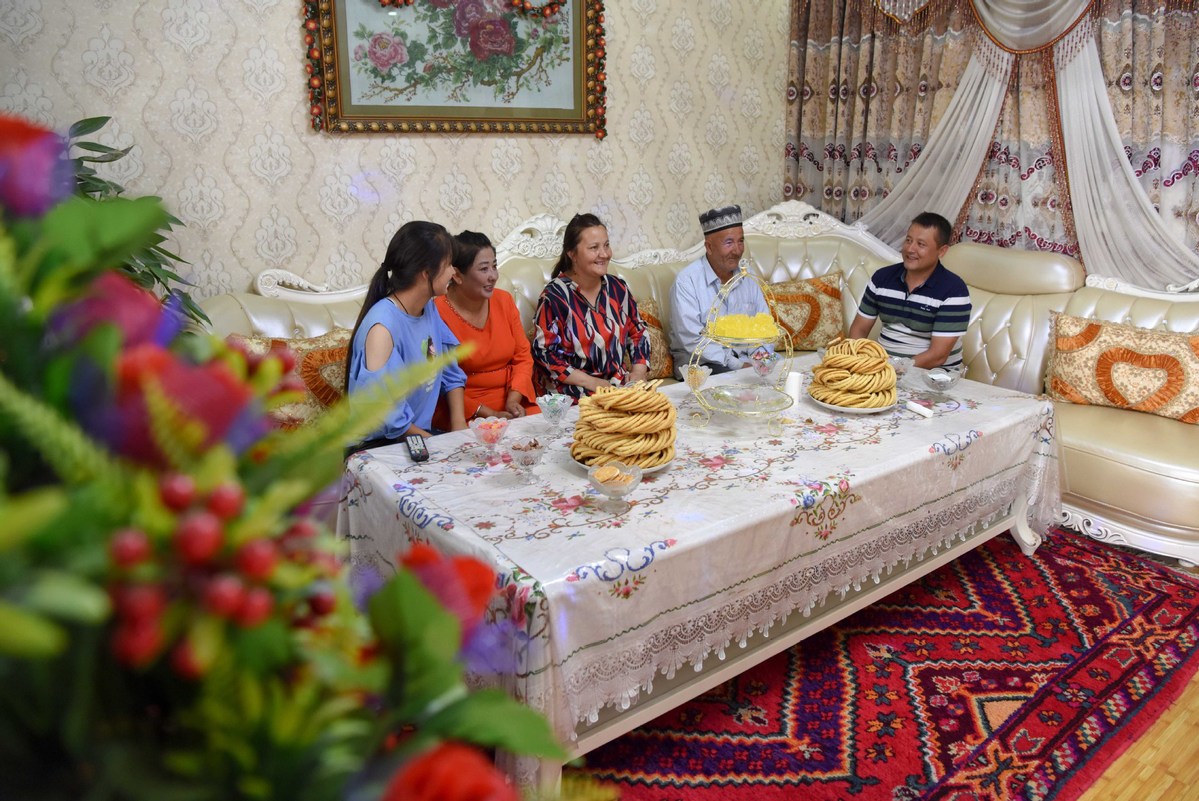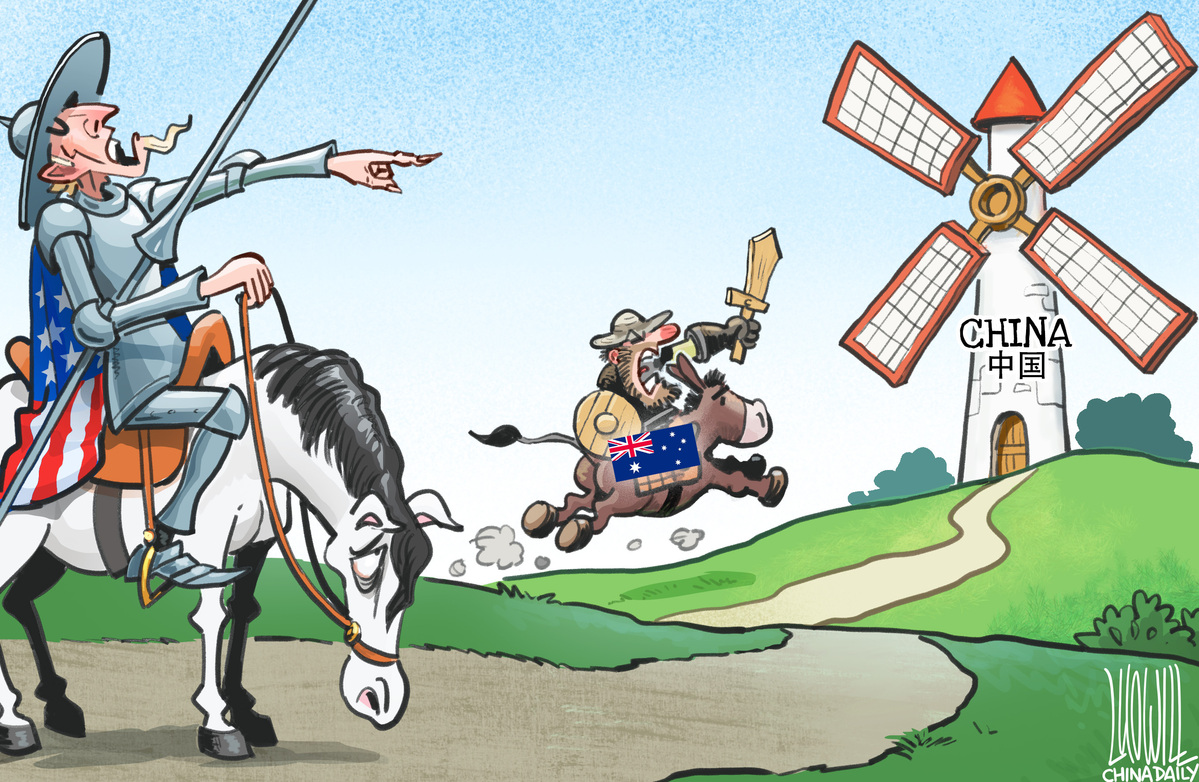What's false and what's true on China-related human rights matters


23. False: Mass forced labor against ethnic minorities is taking place in Xinjiang.
True:
- According to a US news website the Greyzone, the forced labor stories were in fact a PR blitz orchestrated by anti-China forces from the US and Australia.
- The stories were cooked up by the Australian Strategic Policy Institute (ASPI) which has long been funded by the US government and American arms dealers. To serve the interests of its sponsors, the institute blatantly spread disinformation to vilify and demonize China, particularly on Xinjiang-related issues. Together with anti-China forces in the US, the ASPI made up baseless and biased stories to smear and attack Xinjiang's counter-terrorism and deradicalization efforts. The institute has no credibility whatsoever. Former Australian Ambassador to China Geoff Raby sees the ASPI as "the architect of the China threat theory in Australia". Former Qantas Airways CEO John Menadue said the institute "lacks integrity and brings shame to Australia".
- Ethnic minority workers from Xinjiang are part and parcel of the country's labor force. They have the rights to be employed, sign labor contracts, obtain labor remunerations, take rest and vacations, acquire labor safety and health protection, and enjoy social insurance and welfare as prescribed by law. They have the freedom to choose their occupation. Their personal freedom has never been restricted.
- There are only limited job opportunities in the four southern Xinjiang prefectures (Hotan, Aksu and Kashi prefectures, and Kizilsu Kirgiz autonomous prefecture) as industrialization and urbanization there are underdeveloped. The government of the Xinjiang Autonomous Region has taken measures based on the wishes of local people to help them find jobs in their hometowns, nearby cities or other areas of Xinjiang, or in the provinces and cities that have pair-up assistance programs with Xinjiang, thus ensuring peoples' right to work to the maximum extent. Since 2018, Xinjiang has helped 151,000 surplus rural workers from poor families in the southern prefectures to find employment elsewhere. With an average annual income of over 45,000 yuan, these workers have all been lifted out of poverty.
- China has been improving its legal system and its State Council has established an inter-agency mechanism to crack down on crimes such as human trafficking and forced labor. Such efforts have proven effective. China earnestly fulfills its international obligations and has ratified 26 international conventions on human rights. China will continue to strengthen exchanges with all parties and fight forced labor and other crimes together.
24. False: Xinjiang has demolished a large number of mosques.
True:
- Xinjiang has seen sound development of the religion of Islam. The number of mosques in Xinjiang has grown from some 2,000 at the beginning of reform and opening-up in the late 1970s to 24,400 today, more than 10 times that in the United States. In Xinjiang, there is a mosque for every 530 Muslims on average.
- Xinjiang takes the preservation and maintenance of mosques very seriously. Some cramped and dilapidated mosques, those with poor layout designs and those inconvenient for religious activities have been rebuilt, relocated or expanded in light of the needs and wishes of local Muslim communities. Such adjustments have been welcomed by religious leaders and believers.
25. False: Graveyards of ethnic minorities are demolished in parts of Xinjiang.
True:
- Under the regulations of the local authorities, the government does not promote cremation for ethnic minorities observing traditional ways of interment. On the contrary, it takes concrete measures to help preserve the tradition, by designating burial ground and building dedicated cemeteries. Besides, there is no restriction on other ethnic customs followed in weddings, funerals, and name-giving ceremonies.
26. False: The "Pair Up and Become Family" program is designed to monitor ethnic minorities in Xinjiang.
True:
- Since 2016, an extensive ethnic unity campaign has been conducted among government officials and people of different ethnicities in Xinjiang. Some 1.1 million officials have paired up and made friends with 1.6 million local people, treating each other like family members. They have respected and helped each other, and forged deep bonds through close interactions. The officials leveraged their expertise to help local people explore ways to shake off poverty and address difficulties in their lives, such as access to medical services, job opportunities and education. The campaign, with its real, substantial benefits to the public, has been well received by the people of all ethnic groups.
27. False: The local government sends Uyghur children to boarding schools and separates them from their parents.
True:
- The boarding school system is an effective means to improve education in China's remote areas and ease the burden on students and their families. In Xinjiang, students of all ethnicities attend schools closest to their homes. Those living near the campus can be commuter students. For those living further away, schools provide them with free accommodation, plus free meals for those from rural families. It is up to the students and their parents to decide whether to live on or off campus.

28. False: The Chinese government forces sterilization, abortion and birth control on Uyghurs and other ethnic minorities in Xinjiang.
True:
- The Chinese government protects the lawful rights and interests of all Chinese without distinction of ethnicity. Over the years, the Uyghur people and other ethnic minorities have enjoyed a preferential population policy. In the four decades between 1978 and 2018, the Uyghur population in Xinjiang increased from 5.55 million to 11.68 million, accounting for 46.8% of the total population of the autonomous region.
- To put things into perspective, let's look at the situation in the United States. Racial and ethnic minorities in the US have long been the targets of bullying, exclusion, and widespread and systemic discrimination in the political, economic, cultural and social aspects of their lives. Take Native Americans as an example. For quite a long period of time, the US government had been enforcing a policy of genocide, segregation and assimilation against Native Americans. For nearly a century after its founding, the US was uprooting and killing American Indians in its Westward Movement. The Native American population plunged from 5 million in 1492 to 0.25 million in the early 20th century. It now accounts for a mere 2 percent of the US population. Another example, African Americans. African Americans have a COVID-19 infection rate five times that of white Americans, and a much higher mortality rate as well. This highlights the racial inequality in the US. The recent death of an African American George Floyd and the massive protests that followed once again shows that the systemic racial discrimination in the US has reached a point where racial and ethnic minorities "can't breathe". It calls for an urgent solution.
29. False: The Chinese government's brutal crackdown on Muslims is a human rights violation not seen since World War II.
True:
- One of China's five ethnic minority autonomous regions, the Xinjiang Uyghur Autonomous Region is home to 25 million people of different ethnic groups who live and work in harmony. Among them, ten ethnic groups, including Uyghur and Hui, consist mainly of Muslims. The Muslim population has been growing steadily, accounting for nearly 60% of the total local population.
- Under a system of ethnic regional autonomy, China treats all ethnic groups equally and pursues prosperity and development for people of all ethnicities. It ensures that ethnic autonomous areas exercise the power to self-govern in accordance with law, and protects the legitimate rights and interests of ethnic minorities. In Xinjiang, every chairperson of the People's Congress, the autonomous regional government, and the CPPCC regional committee is from ethnic minority groups. Ethnic minorities take 64.2% of the seats in the 13th Xinjiang People's Congress, and 46.7% of the seats in the 13th CPPCC Regional Committee of Xinjiang.
- Xinjiang fully implements the policy of freedom of religious belief. The freedom of religious belief of all people, regardless of their ethnicity, is fully protected in accordance with law. Believers and non-believers enjoy the same political rights and economic, social and cultural rights.
- On 25 May, George Floyd, an African-American, was killed in Minneapolis in a brutal assault by a white police officer. His death triggered massive demonstrations and protests across the country, throwing into sharp relief the public outcry and anger over the systemic racism long in existence in the country. The UN Human Rights Council held an urgent debate and adopted a resolution voicing strong condemnation and urging concrete measures from the US to protect human rights and fundamental freedoms of Africans and of people of African descent.

































